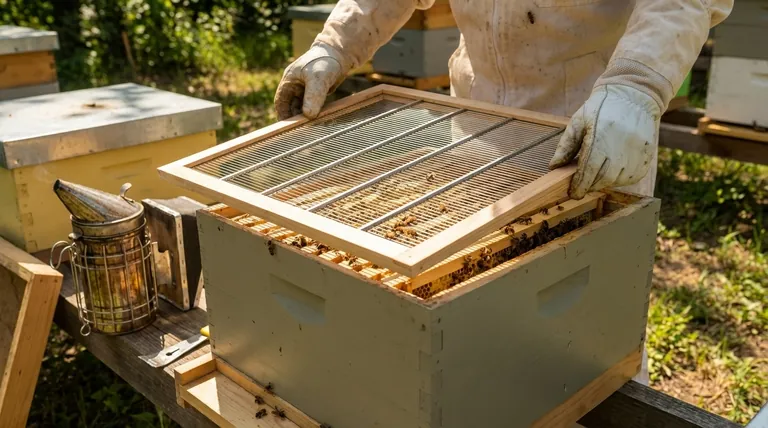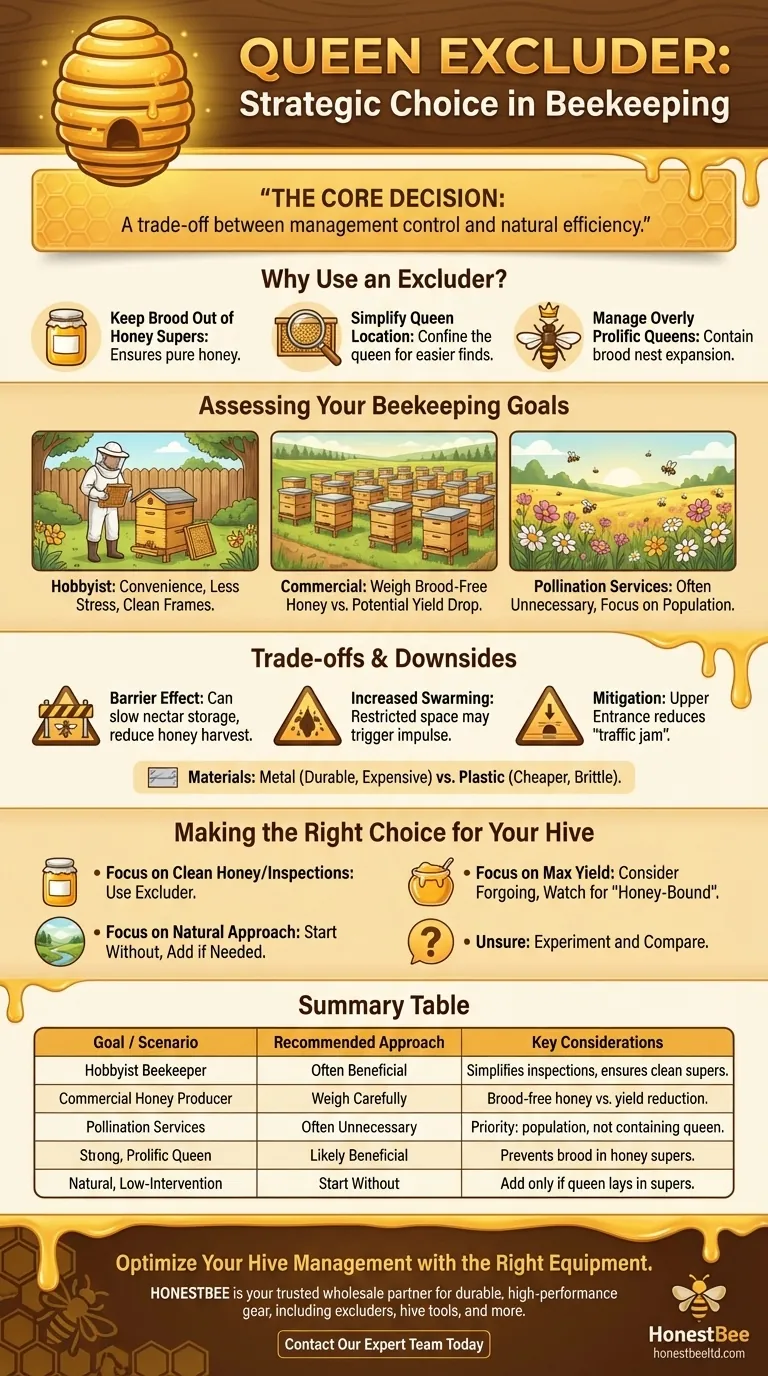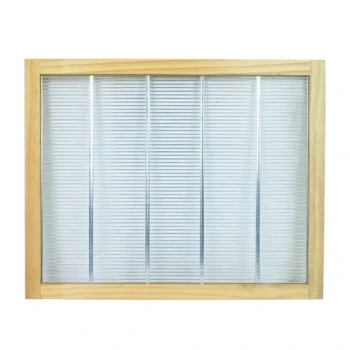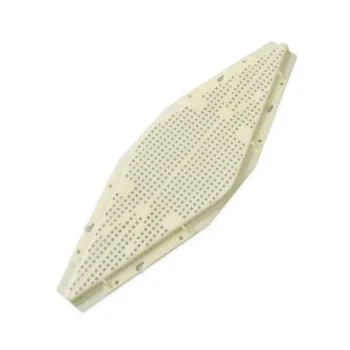The decision to use a queen excluder is not a matter of right or wrong, but a strategic choice based on your specific beekeeping goals, the scale of your operation, and the unique personality of your colony. It offers a way to guarantee brood-free honey supers and simplify queen location, but this convenience comes with potential trade-offs that can impact hive behavior and productivity.
The core decision is a trade-off: a queen excluder provides management control by confining the queen, but it can also act as a barrier that may hinder the natural flow of honey storage. The right choice depends entirely on whether control or natural efficiency is your higher priority.

The Primary Purpose: Why Use an Excluder?
At its core, a queen excluder is a management tool designed to give the beekeeper more control over the internal structure of the hive.
To Keep Brood Out of Honey Supers
The most common reason to use an excluder is to create a distinct separation between the brood nest and the honey storage area. This ensures that frames in your honey supers contain only pure honey, free from eggs, larvae, and pupae, which simplifies the extraction process significantly.
To Simplify Queen Location
For new beekeepers or those performing frequent inspections, finding the queen can be a time-consuming task. By placing an excluder, you know the queen is confined to the brood box(es) below it, drastically reducing the search area.
To Manage Overly Prolific Queens
Some colonies, particularly those from wild or Africanized genetics, have queens that are exceptionally prolific. They may continue expanding the brood nest upwards, filling potential honey frames with brood. An excluder is an effective way to contain this behavior and encourage honey storage.
Assessing Your Beekeeping Goals
Your reason for keeping bees is the most significant factor in deciding whether an excluder fits your management style.
For the Hobbyist Beekeeper
If you have a few backyard hives, the convenience of an excluder is often a major benefit. It makes inspections less stressful and ensures clean honey frames, aligning well with the goals of most small-scale beekeepers.
For the Commercial Honey Producer
Here, the decision is more complex. While brood-free honey is essential, any potential reduction in honey yield caused by bees being hesitant to cross the excluder can impact profits. Many commercial operations do use them, but it's a carefully weighed decision.
For Pollination Services
If your primary goal is pollination rather than honey production, excluders often present an unnecessary hassle and expense. The priority is a large, booming population, and confining the queen is not a primary concern.
Understanding the Trade-offs and Downsides
Using an excluder is not without potential drawbacks. Trust and credibility are built on acknowledging these limitations.
The "Barrier Effect"
The most cited argument against excluders is that they form a barrier that worker bees are reluctant to cross. This can create a "traffic jam" that slows the process of storing nectar in the supers, potentially reducing the overall honey harvest.
Potential for Increased Swarming
If the queen is highly productive and feels her laying space is restricted by the excluder, it can trigger the swarm impulse sooner than in a hive without one. The colony may feel it has run out of room, even if there is ample space above the excluder.
A Practical Mitigation: The Upper Entrance
Providing a small upper entrance above the excluder can significantly reduce the "barrier effect." Foraging bees can enter directly into the honey supers, depositing nectar without needing to travel through the busy brood nest and the excluder itself.
Material Considerations
The type of excluder also matters. Metal excluders are durable and long-lasting but are more expensive and can be bent. Plastic excluders are cheaper and lighter but can be more brittle and may not last as many seasons.
Making the Right Choice for Your Hive
Ultimately, the best decision comes from observing your bees and understanding your own management philosophy. There is no universal rule.
- If your primary focus is clean honey and simplified inspections: Using an excluder is a reliable and highly effective strategy.
- If your primary focus is maximizing honey yield with strong colonies: Consider forgoing the excluder, but remain vigilant for a "honey-bound" brood nest where the queen runs out of laying space.
- If your primary focus is a natural, low-intervention approach: Start without an excluder and only add one if you observe that your queen consistently lays in the honey supers.
- If you are unsure: Experiment. Try using an excluder on one hive and not another of similar strength to see which method works best for you and your bees.
Trust your observations and choose the path that best aligns with the unique behavior of your bees and your personal beekeeping goals.
Summary Table:
| Goal / Scenario | Recommended Approach | Key Considerations |
|---|---|---|
| Hobbyist Beekeeper | Often beneficial | Simplifies inspections, ensures clean honey supers. |
| Commercial Honey Producer | Weigh carefully | Brood-free honey vs. potential yield reduction from barrier effect. |
| Pollination Services | Often unnecessary | Priority is maximizing population, not containing the queen. |
| Strong, Prolific Queen | Likely beneficial | Prevents brood nest from expanding into honey supers. |
| Natural, Low-Intervention | Start without | Add an excluder only if the queen consistently lays in honey supers. |
Optimize Your Hive Management with the Right Equipment
Choosing the right tools is crucial for a successful and productive apiary. Whether you decide a queen excluder is right for your operation or you need other essential beekeeping supplies, HONESTBEE is your trusted wholesale partner.
We supply commercial apiaries and beekeeping equipment distributors with durable, high-performance gear—from excluders and hive tools to protective wear and extraction equipment—designed to meet the demands of modern beekeeping.
Ready to equip your operation for success? Contact our expert team today to discuss your specific needs and discover how our wholesale-focused solutions can help you maximize hive health and productivity.
Visual Guide

Related Products
- Premium Wood Framed Metal Wire Queen Bee Excluder
- High Performance Plastic Queen Excluder for Beekeeping and Apiary Management
- Plastic Queen Bee Excluder for Bee Hive Wholesale
- Professional Plastic Queen Excluder for Modern Beekeeping
- Metal Queen Bee Excluder for Beekeeping
People Also Ask
- Do I really need a queen excluder? A Guide to Maximizing Your Honey Harvest Efficiency
- What is the primary function of a queen excluder? A Guide to Brood-Free Honey Harvesting
- Can a queen get through a queen excluder? A Guide to Preventing Hive Failures
- When to put queen excluder on hive? Key Timing for Maximum Honey Production
- Where should a queen excluder be placed in a beehive? The Key to Hive Organization



















